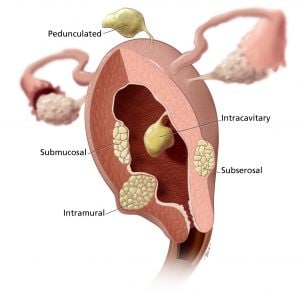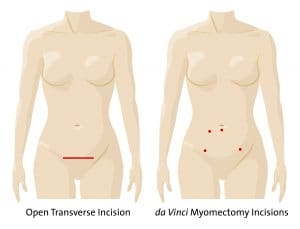Condition: Uterine Fibroid (Fibroid Tumor)
A uterine fibroid is a benign (non-cancerous) tumor that grows in the uterine lining, inside, and/or outside the uterus. Uterine fibroids are most common in women ages 30 to 40, but can occur at any age. About 20 to 80% of women have one or more fibroids by age 50. Uterine fibroids are the most common reason for a hysterectomy. Fibroids may grow in size and also become more common with age, but they may shrink after menopause. Not all women have fibroid symptoms.
 When symptoms are present, they can include heavy menstrual bleeding, pelvic pain, frequent urination and difficulty getting pregnant.
When symptoms are present, they can include heavy menstrual bleeding, pelvic pain, frequent urination and difficulty getting pregnant.
Uterus shown with five types of fibroid tumors. The tumors are named for their location relative to the uterine wall.
When medicine, lifestyle changes and other treatments do not ease your symptoms, your doctor may suggest surgery.
Surgery
Myomectomy is the surgical removal of the fibroid(s) while leaving your uterus in place. Myomectomy may be suggested for women who want to become pregnant or keep their uterus for other reasons. Myomectomy can be done using traditional open surgery, minimally invasive surgery (laparoscopy), or robotic surgery.
Using a da Vinci® robot, surgeons make a few small incisions – similar to traditional laparoscopy. The robot is designed to provide surgeons with enhanced capabilities, including high definition 3D vision and a magnified view. Your doctor controls the robot, which translates his or her hand movements into smaller, precise movements of tiny instruments inside your body. The robot cannot act on its own. Surgery is performed entirely by the surgeon.

Benefits of Robotic Surgery
Compared with traditional open surgery, robotic surgery requires significantly smaller incisions. The potential benefits for Myomectomy patients include:
- Shorter hospital stay
- Low risk of complications
- Minimal blood loss
- Less chance of post-operative fever
- Reduced pain
- Less scarring
- Fast recovery time
Talk to your doctor to decide if robotic surgery is right for you. As with any surgery, there are risks.